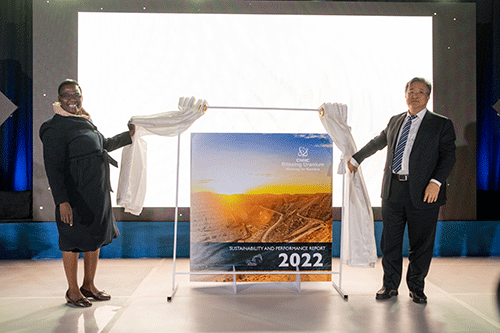Deputy mines minister Kornelia Shilunga told the mining sector that good relations, not just with the government but also with relevant communities, is crucial for the well-being of mining companies in Namibia. Shilunga was speaking on Monday during the launch of Rössing Uranium’s 2022 Sustainability and Performance Report.
“Always keep in mind that good relationships can protect a mine’s licence to operate. Thus, it is important to constantly build good relationships with local communities by creating value for these communities,” said Shilunga, adding the Rössing mine remains the pillar of Namibia’s mining industry.
The deputy minister further encouraged mining companies to continue striving to incorporate sustainability into their respective operations and play their part in the nationwide movement to advance the country’s sustainability agenda by developing plans that consider the interests of people, communities, and the environment around the mines, bearing in mind the local circumstances and the life cycle of mines.
However, Shilunga expressed concern regarding the level of local procurement in the mining industry, which she said was not yet at a satisfactory level despite its potential to improve the plight of previously disadvantaged Namibians and youth who are mostly left out of these opportunities.
“I am convinced that the best strategy is to empower the youth where the mine is operating, to invest in related sectors such as agriculture, manufacturing, tourism etc. This will, in turn, provide positive impetus to the local economy with an opportunity to adapt to the mine’s presence and to ideally survive post-mine closure,” she urged.
Shilunga further called upon all operational mines to increase support to local businesses such as the small miners as well as to upcoming young entrepreneurs.
At the same occasion, Rössing Uranium managing director Johan Coetzee said total revenue earned by the company amounted to N$4.84 billion in 2022, compared to N$4.26 billion in 2021, with N$840 million net profit after tax from normal operations compared to N$193 million in 2021. This resulted in the company declaring a total interim dividend of N$49.7 million.
Coetzee noted total production in 2022 was lower when compared to 2021. A total of 16.6 million tonnes was mined, compared to 20.7 million tonnes in 2021, with waste and low-grade ore totalling 7.4 million tonnes. The lower mining volume was due to a reduction of the stripping ratio of waste to ore as the miner moved deeper into the massive mining pit. Coetzee added a total of 2 659 metric tonnes of uranium oxide was produced, compared to 2 882 metric tonnes in 2021.
According to the report, Rössing Uranium contributed approximately 4.4% to the world’s primary production during 2022, with Namibia now being the third largest primary producer of U3O8 globally, after Kazakhstan, who continues to dominate the market from a supply side, and Canada. U3O8, also known as Yellowcake, is a uranium concentrate powder recovered from leach solutions. U3O8 is a mixture of uranium oxides produced after milling uranium ore.
“Rössing’s spending on local suppliers amounted to N$2.54 billion during 2022 (2021: N$2.25 billion), accounting for 74% of our total procurement expenditure. Rössing Uranium supported the Rössing Foundation and other community initiatives with an investment of N$29.4 million in 2022 compared to N$14 million in 2021. Of this amount, N$25 million was donated to the Rössing Foundation, and over N$4 million was in-kind and cash contributions to worthy community initiatives,” Coetzee outlined.


